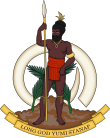Flag of Vanuatu
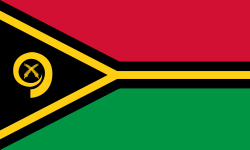 Flag of Vanuatu | |
| Flaeg blong Vanuatu | |
| Use | National flag, civil and state ensign |
|---|---|
| Proportion | 2:3, 3:5 or 19:36 |
| Adopted | 18 February 1980 |
| Design | A horizontal bicolor of red and green with a golden pall, fimbriated in black, with a black chevron filling the lefthand space (alternately, a golden fillet pall surmounting a black gusset) and two gold crossed namele cycad fronds encircled in a gold boar tusk centered on the chevron. |
| Designed by | Kalontas Mahlon |

The national flag of Vanuatu (flaeg blong Vanuatu) was adopted on 18 February 1980.[1]
In 1977 a flag of almost the same colours and symbolism as the future national flag was designed by local artist Kalontas Malon and adopted by the Vanua'aku Pati. When the party led the New Hebrides to independence as Vanuatu in 1980, the colours of the party flag (red, green, black and yellow) were chosen to be the basis for the national flag on Independence Day, 30 July 1980. A parliamentary committee chose the final design based on submissions from local artists.[1]
Symbolism
[edit]
The green represents the richness of the islands, the red symbolises blood which unites humanity as humans, and the black the ni-Vanuatu people.[2] The Prime Minister of Vanuatu, Father Walter Lini, requested the inclusion of yellow and black fimbriations to make the black stand out. The yellow Y-shape (pall) represents the shape of Vanuatu islands on the map and the light of the gospel going through the pattern of the islands in the Pacific Ocean (approximately 83% of the people of Vanuatu profess Christianity).[1][3][4]
The emblem in the black is a boar's tusk—the symbol of customs and tradition but also prosperity. It is worn as a pendant on the islands—along with two leaves of the local namele tree. These leaves are supposed to be a token of peace, and their 39 leaflets represent the original 39 members of the Parliament of Vanuatu.[1]
Construction
[edit]The government does not publish a formal specification sheet on its website. The construction sheet shown below is based on measurements from the official 2:3 flag image that appears in the State Flag and Armorial Bearings Public Declaration dated March 18, 1980.[5]
Other flags of Vanuatu
[edit]Government flag
[edit]| Flag | Date | Use | Description |
|---|---|---|---|
 |
1980–present | Presidential standard | A green field with a red border and the national coat of arms in the center.[1] |
Military flags
[edit]| Flag | Date | Use | Description |
|---|---|---|---|
 |
1980–present | A white field with the national flag in the canton.[1] | |
 |
Flag of Vanuatu Mobile Forces | ||
 |
Flag of Vanuatu Police Force |
Political flags
[edit]| Flag | Date | Use | Description |
|---|---|---|---|
| Link to file | 1966–present | Flag of the Nagriamel Movement | |
| Link to file | 1971–present | Flag of the Vanua'aku Pati |
Subnational flags from Vanuatu
[edit]Provincial flags
[edit]| Flag | Date | Use | Description |
|---|---|---|---|
 |
?–present | Flag of the Malampa Province | |
 |
?–present | Flag of the Penama Province | [6] |
 |
?–present | Flag of the Sanma Province | [7] |
 |
?–present | Flag of the Shefa Province | [8] |
 |
?–present | Flag of the Tafea Province | |
 |
?–present | Flag of the Torba Province | [9] |
Secessionist group flags
[edit]| Flag | Date | Use | Description |
|---|---|---|---|
 |
1980 | [10] | |
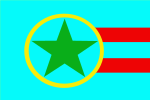 |
1980 | Flag of the island of Tanna, in Tafea Province, and of its secessionist movement | [11] |
City flags
[edit]| Flag | Date | Use | Description |
|---|---|---|---|
 |
2020–present | Flag of Port Vila | [12] |
 |
?–2020 | Previous flag of Port Vila | |
 |
?–present | Flag of Luganville | [13] |
Historical flags of the New Hebrides
[edit]| Flag | Date | Use | Description |
|---|---|---|---|
 |
1887–1906 | Flag of the Anglo-French Joint Naval Commission | A vertical bicolour of red and white with a blue square in the center and five 5-pointed stars inside the square.[14] |
 |
1906–1953 | Flag of the British New Hebrides | A blue ensign with the emblem of New Hebrides (with The Tudor Crown). |
 |
1906–1953 | Flag of the British resident commissioner | The Union Jack defaced with the emblem of New Hebrides (with the Tudor Crown).[14] |
 |
1953–1980 | Flag of the British New Hebrides | A blue ensign with the emblem of New Hebrides (with the St Edward's Crown)[14] |
 |
1953–1980 | Flag of the British resident commissioner | The Union Jack defaced with the emblem of New Hebrides (with the St Edward's Crown).[14] |
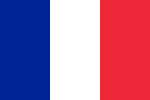 |
1906–1940 1944–1980 |
Flag of the French New Hebrides | A vertical tricolour of blue, white, and red (proportions 3:2).[15] |
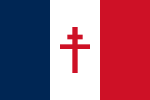 |
1940–1944 | Flag of the Free French administration of New Hebrides | A vertical tricolour of blue, white, and red with the Cross of Lorraine.[14] |
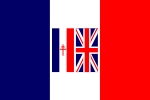 |
1963 | Flag attested as being used in the 1963 South Pacific Games | A vertical tricolour of blue, white, and red with the flags of France and the United Kingdom in the center.[14] |
 |
1966; 1971 | Flag attested as being used in the 1966 and 1971 South Pacific Games | A blue field with the emblem of the New Hebrides in the center.[14] |
 |
1969 | Dark blue version attested at the time of the 1969 South Pacific Games | Similar to the previous flag.[16][better source needed] |
 |
1980 | Flag of the ephemeral Republic of Vemerana | A blue field with a green 5-pointed star in the center. |
 |
1980 | Flag of the People's Provisional Government of Vanuatu led by Vanua'aku Pati | [18] |
See also
[edit]References
[edit]- ^ a b c d e f "Vanuatu". Flags of the World. 20 November 2013. Retrieved 2 August 2014.
- ^ "Vanuatu Flag and Description". www.worldatlas.com. Retrieved 7 October 2019.
- ^ Department of State. The Office of Electronic Information, Bureau of Public Affairs (14 September 2007). "Vanuatu". 2001-2009.state.gov. Retrieved 7 October 2019.
- ^ "Flag of Vanuatu". Encyclopedia Britannica. Retrieved 7 October 2019.
- ^ "State Flag and Armorial Bearings Public Declaration". www.paclii.org. Retrieved 17 February 2023.
- ^ "Penama Province (Vanuatu)". Flags of the World. 13 April 2013. Retrieved 2 August 2014.
- ^ "Sanma Province (Vanuatu)". Flags of the World. 18 December 2013. Retrieved 2 August 2014.
- ^ "Shefa Province (Vanuatu)". Flags of the World. 8 July 2006. Retrieved 2 August 2014.
- ^ "Tafea Province (Vanuatu)". www.fotw.info. Retrieved 12 July 2022.
- ^ "TAFEA Nation (Vanuatu)". Flags of the World. 21 February 2009. Retrieved 2 August 2014.
- ^ "Nation of Tanna (Vanuatu)". Flags of the World. 20 July 2013. Retrieved 2 August 2014.
- ^ "Shefa Province (Vanuatu)". www.fotw.info. Retrieved 12 July 2022.
- ^ "Luganville (Vanuatu)". www.fotw.info. Retrieved 12 July 2022.
- ^ a b c d e f g "Historical Flags (Vanuatu)". Flags of the World. 10 June 2011. Retrieved 2 August 2014.
- ^ "Vanuatu". World Statesmen. 10 June 2013. Retrieved 27 September 2016.
- ^ postage stamp New Hebrides Condominium 1F featuring 3rd South Pacific Games Port Moresby 1969 dated 1969
- ^ "State of Vemerana (Vanuatu)". Flags of the World. 14 February 2007. Retrieved 2 August 2014.
- ^ "Vanuatu". World Statesmen. 10 June 2013. Retrieved 27 September 2016.
Sources
[edit]- "Vanuatu". The World Factbook. United States Central Intelligence Agency. 20 June 2014. Archived from the original on 9 January 2021. Retrieved 2 August 2014.


